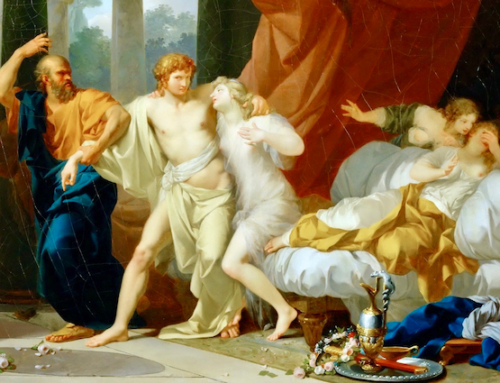Plato was a moralist. An ethicist. He was concerned with the primacy of action, of engagement, in a world that was deeply iconoclastic, barbarous, and savage. Love of wisdom allows for the creation of that space where ethical and loving life is possible.
 Plato’s Symposium is one of the most iconic works of literature in the Western tradition. While The Republic may be more famous, Symposium is the most graphic, intense, and dramatic of the dialogues. Its legacy has been far reaching, inspiring religion and mysticism, to visions of art, the good, and the beautiful. The Symposium is about love, eros more specifically. But the dialogue, beyond being the culminating triumph of Plato’s literary hand, is equally poetic. Plato stands on the side of the poets rather than the “philosophers.” In fact, the dialogue is a mythological drama about the fate of love and its place in the new world born of technology, the political, and the philosophical.
Plato’s Symposium is one of the most iconic works of literature in the Western tradition. While The Republic may be more famous, Symposium is the most graphic, intense, and dramatic of the dialogues. Its legacy has been far reaching, inspiring religion and mysticism, to visions of art, the good, and the beautiful. The Symposium is about love, eros more specifically. But the dialogue, beyond being the culminating triumph of Plato’s literary hand, is equally poetic. Plato stands on the side of the poets rather than the “philosophers.” In fact, the dialogue is a mythological drama about the fate of love and its place in the new world born of technology, the political, and the philosophical.
Aristotle said that the lover of myth is also the lover of wisdom. Symposium is unique among Plato’s dialogue that two of the central speakers are poets, playwrights, the type of poets whom Plato wanted to ban in his ideal city in The Republic. Plato’s harsh condemnation of the poets often causes us to fail to realize Plato was himself a poet. His works are dialogues. They incorporate myths. They tell grand tales of grandeur and fall. They are comedic and tragic. Plato may have been arrogant in thinking himself the true poet among imitators of the false image; yet, Plato’s own artistry should be self-evident once given some thought. Plato’s stories inspire us after two and half millennia while other philosophers, serious philosophers, who wrote equally serious tomes, have been forgotten to all except the specialists.
It is fitting that this dialogue on love includes a bunch of love triangles. Phaedrus, Pausanias, and Aristophanes form the trio of speakers who incorporate love with pederasty. Eryximachus, Agathon, and Socrates give speeches about how love pervades all things and form a trio in contrast to Phaedrus, Pausanias, and Aristophanes. We also have a trio embodying love as a judge; Alcibiades, Socrates, and Agathon all serve, in some capacity, as judges in the course of the dialogue. At the end of the dialogue, with night fallen, Socrates speaks with Aristophanes and Agathon.
The world of philosophy before Plato can be broken down into two epochs: the epoch of the Ionian metaphysicians and the age of the sophists. Plato was responding to both prior currents of philosophy in his many works. Timaeus, for instance, gives a famous cosmological account of the world and life that would have been more fitting to the bygone age of the Ionian metaphysicians; however, Plato rejects the atomism and hollow materialism of materialist and mechanical metaphysicians whose outlook would threaten to destroy eros. It isn’t surprising, then, that one such speaker is included in Symposium recapitulating this theme of materialist de- mythology. Plato’s intense hatred for the sophists should be clear enough to anyone who has read Plato, and his emphasis on truth, ethics, and the good stand as the reactive force against the world of Thrasymachus, Glaucon, and Protagoras.
But the world before philosophy was the world of poetry and myth. That world, the garden of Hesiod, Homer, and Sappho, was threatened by the Ionian metaphysicians and sophists who saw no use in those silly and superstitious accounts of the gods, heroes, and captive souls. The birth of philosophy coincided with the birth of de-mythology; and the Symposium includes an intense struggle between the corrupt force of de-mythology and the life-giving and inspiration force of re-mythology. This contest between de-mythology and re-mythology, or mythology, is the drama of Eros.
Eros is on trial over the course of Symposium. Eros, who is also a god, is therefore set in the crosshairs of those who claim to be defending him but are really destroying him. The trial of eros is also the trial of physis, of nature. The more central battle between de-mythology and mythology is also a crisis between physis and nomos, of nature and convention.
Symposium is also a political text as are all of Plato’s dialogues. Even Timaeus is an esoteric account of the political. Socrates and Critias give political speeches and we fully expect Timaeus to do the same. Timaeus’ lengthy discourse on cosmology, the Demiurge, mathematics, reason and necessity, eventually shows its hand toward the end when Timaeus says, “In addition, when men who are constitutionally unsound, as I’ve been describing, live in cities with pernicious political systems and hear correspondingly pernicious speeches… become bad.”[1]
Plato is asking, without directly posing it, can the polis survive without eros? This equally entails, in relation to Aristophanes’ iconoclastic speech, can the polis survive eros (at least as conceived by Aristophanes)? Must eros be destroyed for the polis to survive? Can eros be ordered to something productive and edifying rather than destructive and restless?
Culling Eros
The first person to speak in Symposium is not one of the main speakers on eros. Instead, we have a flash-forward preface with Apollodorus and Glaucon. Glaucon is searching for Apollodorus to know how the famous speeches on love went. Plato’s genius is seen even in the opening sentences of the dialogue. In searching for Apollodorus to know how the discourses on love went, Plato foreshadows what the dialogue is about: eros and knowledge. This brief introduction sets the stage for what is to come.
Phaedrus, Pausanias, and Eryximachus are the first principal characters to give their speeches on love. Pheadrus offers a brief account that amounts to love as selfishness; it is an internal desire not seeking anything outside of oneself. Phaedrus’ account of love is premised on winning the affection of the other. Pausanias offers the next speech. Like Phaedrus, it is relatively short. Pausanias subjects eros to morality, specifically to friendship and law.
The two speeches by Phaedrus and Pausanias are unpassionate and ultimately exterminate eros. By subverting it to other things, eros does not have its own end in of itself; it is eventually cut off by selfishness (in Phaedrus’ account) or morality (Pausanias’ account). What is important to realize is that both men also pay homage to Hesiod before beginning their accounts. Phaedrus is explicit and names Hesiod as his authority. Pausanias is slyer but his account of love and mentioning of Aphrodite is lifted from Hesiod’s Theogony to which he is making indirect references but to which the educated reader will recognize.
The irony of the homages to Hesiod is that the Hesiod of their speeches is nothing more than a figment de-mythologized from his great—if not overly carnal, sensual, and violent—poem. The birth of the gods is through lust, sex, and war. Aphrodite burst forth and rose from the open womb of the sea only after Cronos had castrated Uranus and his phallus had fallen into the sea to give birth to her.
Pausanias’ speech, in many ways, builds from Phaedrus. Phaedrus’ speech lacked any bonds of relationship to which Pausanias restores or sees as being necessary from Phaedrus’ speech. Without morality we cannot survive and thrive, but the love which Pausanias defends is, perhaps to some, also immoral. Phaedrus’ pederasty was based on objectified libido dominandi. It is rooted in manly domination. Pausanias doesn’t disagree, “That is why,” he argues, “this Love’s inspiration makes people feel affection for what is inherently stronger and more intelligent—which is to say that it makes people incline towards the male.”[2]
Unqualified praise, the praise of impetuous desire, is eliminated by the end of Pausanias’ speech where praise is not tethered to being controlled. “[T]heir behavior,” speaking of the relational bonds of lovers, “—any behaviour—wouldn’t warrant criticism, surely, if it were moderate and within the guidelines of convention.”[3] The primacy of nomimōs, νομίμως, is how Pausanias ends his discourse on love. Revealing this struggle between nature and convention.
By the end of Phaedrus’ and Pausanias’ speech, the irony of love’s invocation at the beginning is that love has been cut down to size in both accounts. Love has been culled in the service of convention, of law, of regulation. Love has been altogether eliminated from their accounts as selfishness and regulated convention triumph over it.
While Aristophanes was slated to speak next, hiccups cause him to be replaced by Eryximachus. This is intentional on Plato’s part because Eryximachus and Aristophanes are dialectical opposites of each other. But in being dialectical opposites, they are also interchangeable as myth gives way to de-mythology and de-mythology is challenged by new mythoi. It is an endless cycle of conflict between mythos and anti-mythos which the Symposium itself recapitulates.
Eryximachus represents the hubris of science. He will cite Hesiod like Phaedrus and Pausanias, but his account of the harmony of love in the cosmos is the empty rainbow of modern science. It is a world, paradoxically, devoid of love despite his speech asserting the universality of love pervading the whole cosmos. Moreover, any reader of Hesiod would be baffled by Eryximachus’ assertion of the harmony of the gods and the seasonal cycles. Hesiod’s world of virility and seasonal cycles is excessively disharmonious. The gods clash with each other in violent ways; Persephone is dragged down to the underworld by Hades to be raped and then released back to earth to signal the arrival of spring only after having been impregnated with (new) life.
Eryximachus’ speech is the ultimate culling of love. In his speech, the passionless doctor strips passion from the world while claiming passion pervades all things in a harmonious waltz. Like the Ionian metaphysicians and sophists, Eryximachus has no time for myth, for poetry and the arts, and utterly eviscerates mythoi. He drops the blade of death over Love’s head which was the direction set forth by Phaedrus and Pausanias. Love had been placed on trial and found wanting, lacking, and dangerous; the response from Pausanias, Phaedrus, and Eryximachus was to castrate Eros and kick him out into the cold street while claiming to be his disciples or devotees.
This is compounded when Eryximachus assails sacrilege at the close of his speech. His falsity is on display for any educated reader of the poets and the classics. His farce nature, his hubris, now totally revealed. “Sacrilegious behaviour of any kind towards one’s parents (alive or dead) and the gods tends to be the consequence of failing to gratify the moderate Love,” he says.[4]
The passionate love that is eros has been culled to a moderate love; but Eryximachus’ condemnation of sacrilege is a condemnation of himself. Eryximachus, more so than Phaedrus and Pausanias, has been the most sacrilegious of speakers.
By the end of Eryximachus’ speech Love has been thoroughly de-mythologized by this denizen of science and medicine. For a man supposed to be in the business of protecting life, he has destroyed life. Now the rest of the dialogue is about defending Love, restoring Love, and, in the process, resuscitating life which had been stripped away by the coup de grâce of the high priest of the empty rainbow.
Restoring Eros
By the time Aristophanes’ hiccups have subsided, the great comic playwright steps up and gives the first memorable and passionate speech in the whole dialogue. Yet, he follows the sacriligous footsteps of Eryximachus. While Phaedrus, Pausanias, and Eryximachus asserted Eros to be the oldest god, Aristophanes does not. But Phaedrus, Pausanias, and Eryximachus killed Eros. Aristophanes may have demoted Eros but is also restoring Eros—or at least trying to resurrect Eros in response to the speeches that came before him.
If Phaedrus, Pausanias, and Eryximachus de-mythologized Eros, then Aristophanes is undeniably re-mythologizing eros. Furthermore, Aristophanes is a reactionary. He is reacting against the encroachment of nomos, of science and law, of the political, of that regulated morality, against the mad genius and creativity of art and poetry. His passionate speech is also a passionate plea of the importance of art, of poetry, of plays; it is as much a speech made in defense of love as it is in defense of his own profession which is mocked and scorned by philosophers, scientists, and other “enlightened” people who are above the supposed petty and howling superstitions peddled by men like Aristophanes.
Aristophanes’ speech is the most carnal, sensual, and sexual of all the speeches. It is the speech of a mad genius. It is the speech of a man of passion who has seen his god put on trial and killed. Now he is lashing out at the world because his beloved idol has been slain.
The literary remarkability of Aristophanes’ speech has been well-commented on by scholars and readers for centuries. It is the greatest literary accomplishment of Plato. Although Plato unquestionably makes Aristophanes out to look like a fool, Aristophanes is the first person to get something fundamentally right about love. Love comes from a hole, a wound, a missing link that drives us onward as if exiles looking for a place of serenity and rest.
The mythological speech from Aristophanes may be a myth, but it contains the only truth thus far annunciated in the dialogue. In that sense, what Aristophanes had said is a myth in the truest and most ancient sense: a proclamation. Aristophanes’ proclamation, his myth, unlike those proclamations which came before him, contains the first seed of truth in the dialogue.
The irony is that Phaedrus, Pausanias, and Eryximachus—in their de-mythologization of Eros—were the ones who engaged in “myth” in the modern understanding of the term as something untruthful. Those men did not speak truth in their speeches. Their mythos is anti-mythos. Aristophanes’ mythos is the mythos that the lover of wisdom naturally grapples with to penetrate the dark unconscious reality of what Aristophanes proclaimed in his ecstatic and rage-filled performance.
There is, nevertheless, a problem with the hyper erotic account of love given by Aristophanes. It is one of agony, of restlessness, and of destruction. The speech has destruction as its central thesis. Love did not spill out into the world with millions of erotes filling the world until Zeus split humans in half for their arrogance of challenging the gods. The punishment for sacrilege was the birth of love. It is critically important for Aristophanes to have spoken after Eryximachus because the hubris of the first three speakers who, in feigning platitudes to the gods, challenged the gods. Aristophanes is now the stand in for Zeus, throwing thunderbolts left and right in his speech and wreaking havoc and chaos in the process against his enemies.
Aristophanes was more than a reactionary. He was an iconoclast. His reaction against the death of Eros was to destroy those forces, those institutions, those structures, which had decapitated Eros in the first place. He is the anguished lover taking vengeance for the death and dethronement of his beloved. It was necessary, therefore, for Agathon to be the antithetical corrective to Aristophanes’ destructive fury.
Beneath it all, however, Plato’s use of comic equivalence through Aristophanes sets the stage for the rest of the dialogue to unfold. Socrates is far from a de-mythologizer. He is equally engaged in the project of re-mythology. After all, his dialogue—the first dialogue after having been preceded by a set of five monologues or speeches—deals with a priestess, mysticism, and the gods. Like Aristophanes, who is reacting violently against the earlier speeches, Socrates deftly rebuts all the previous speeches too. He alludes to all the previous speakers and, in the course of his re-imagined dialogue with Diotima, refutes their propositions (or refutes parts of their propositions while slyly building on whatever grains of truth they may have brought to light).
In the course of the Socratic cross examination with Agathon (who gave the most rhetorically eloquent, beautiful, of the speeches), Socrates exonerates—at least in part—aspects of Agathon and Aristophanes. Socrates agrees that love includes the good which was half of Agathon’s speech. Socrates also agrees that love is lacking, which was the central point of Aristophanes’ bombastic tirade. The restlessness of Aristophanes becomes the restless pursuit of wisdom in Socrates’ speech about Diotima’s Ladder. The eloquence and the goodness of Agathon are reassembled to be the good that love seeks in the climb to wisdom.
Plato, through Socrates, is decidedly on the side of the poets. He is not only engaged in a re- mythology against the de-mythologizers, but he also draws on the two partial truths revealed by the mad Aristophanes and the eloquent Agathon, synthesizing the two together in Socrates’ most remarkable dialogue and vision which has reverberated through the millennia.
At the same time, Socrates’ cross-examination and dialogue on the ladder of philosophia is meant to reveal the limits of poetry in its more primeval, ancient, and reactionary form. Despite the half-truths contained in Aristophanes and Agathon, who offered the two most impassioned speeches, their speeches were grounded in rhetoric instead of reason or persuasion. When one is on trial, as Eros is in the dialogue, the defense needs to be persuasive rather than wholly impassioned.
Hence why Socrates’ account of love is a persuasive dialogue between seeker and knower who invites the seeker to participate in reason. Socrates does not resort to the overly dramatic rhetoric of Aristophanes or the eloquent rhetoric of Agathon. Instead, Socrates is engaged in the art of diálogos. Truth is found in dialogue. Truth is participatory. Truth is in engagement.
Exonerating Eros
By the time Socrates concludes his dialogue he has offered a defense of the importance of eros before Alcibiades storms into the gathering in a drunken stupor. Alcibiades enters, as a political figure—the very embodiment of the polis and all the force behind it—to act as judge. He judges Socrates the winner. But Socrates, in talking to Aristophanes and Agathon [5], judges them to be the winner. In having Socrates impregnated, if you will, by Aristophanes and Agathon, Plato is the winner because he is the child born of comedy, tragedy, and philosophy. Can we have multiple winners? Yes.
Plato did not subvert love in the way that Phaedrus, Pausanias, and Eryximachus did because Eros is not the oldest of the gods. Like Aristophanes, Plato accepts Eros as a lower god and a god more intimately bound up in human nature.
With that said, Plato was forced to direct love to something productive rather than restless and destructive. Aristophanes’ love and lover are pre-political. Socrates’ love and lover are conducive to the political and aid the political. In one massive swoop, Plato demolishes the political aspects of Phaedrus and Pausanias whose accounts of love eventually lead, ironically, to softness and death despite having preached manliness and strength. What irony, all things considered. The constant and always striving ascent in Socrates ensures that love perpetuates into activa, or action, upon attaining knowledge which demands us to act and act rightly.
At the end of The Republic, Er is resurrected and given knowledge of true reality by the gods and told to return to earth to inform the world of this new knowledge. Plato was a moralist. An ethicist. He was concerned with the primacy of action, of engagement, in a world that was deeply iconoclastic, barbarous, and savage. Love of wisdom allows for the creation of that space where ethical and loving life is possible. This means that eros must remain to any understanding of the self, world, and politeia. It also means, however, that the energy of love be directed—though not subverted—to productive ends. Eros was on trial in Plato’s time. In the course of the dialogue, Plato attempts to defend and exonerate Eros from the de-mythologizers. We are left to judge if he succeeded.
The Imaginative Conservative applies the principle of appreciation to the discussion of culture and politics as we approach dialogue with magnanimity rather than with mere civility. Will you help us remain a refreshing oasis in the increasingly contentious arena of modern discourse? Please consider donating now.
[1] Timaeus, 87b.
[2] Symposium, 181c.
[3] Ibid., 182a.
[4] Ibid., 188c.
[5] Ibid., 223c.
Editor’s Note: The featured image is a painted scene from Plato’s Symposium (1869) by Anselm Feuerbach, courtesy of Wikimedia Commons.







Leave A Comment